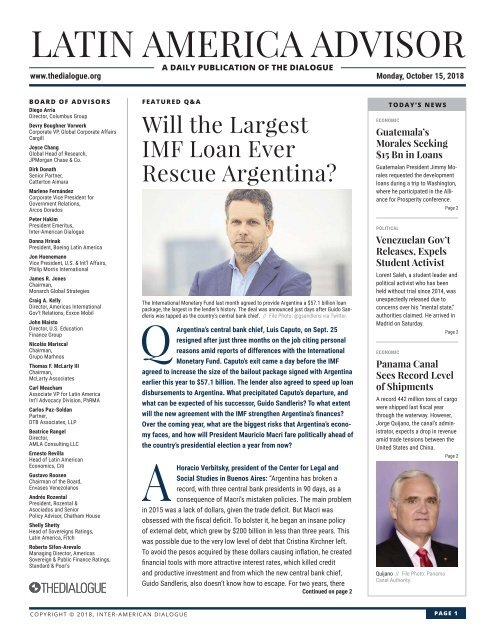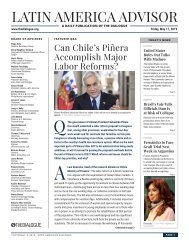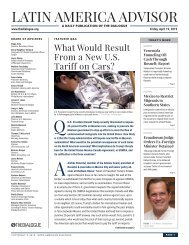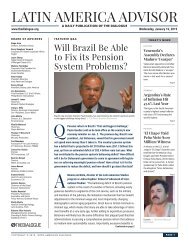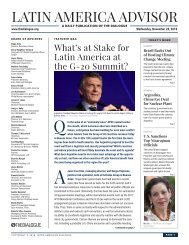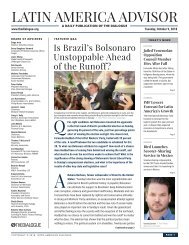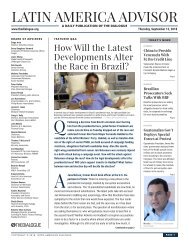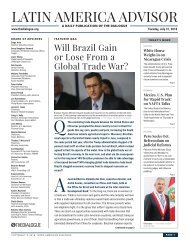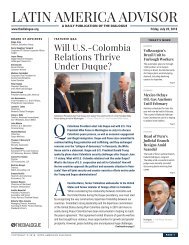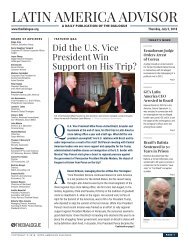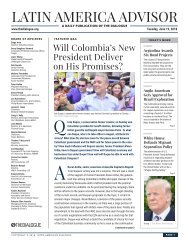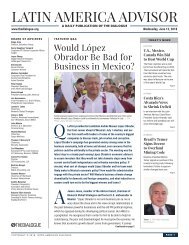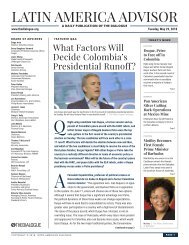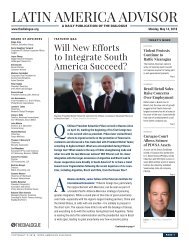Create successful ePaper yourself
Turn your PDF publications into a flip-book with our unique Google optimized e-Paper software.
LATIN AMERICA ADVISOR<br />
A DAILY PUBLICATION OF THE DIALOGUE<br />
www.thedialogue.org Monday, October 15, 2018<br />
BOARD OF ADVISORS<br />
Diego Arria<br />
Director, Columbus Group<br />
Devry Boughner Vorwerk<br />
Corporate VP, Global Corporate Affairs<br />
Cargill<br />
Joyce Chang<br />
Global Head of Research,<br />
JPMorgan Chase & Co.<br />
Dirk Donath<br />
Senior Partner,<br />
Catterton Aimara<br />
Marlene Fernández<br />
Corporate Vice President for<br />
Government Relations,<br />
Arcos Dorados<br />
Peter Hakim<br />
President Emeritus,<br />
Inter-American Dialogue<br />
Donna Hrinak<br />
President, Boeing Latin America<br />
Jon Huenemann<br />
Vice President, U.S. & Int’l Affairs,<br />
Philip Morris International<br />
James R. Jones<br />
Chairman,<br />
Monarch Global Strategies<br />
Craig A. Kelly<br />
Director, Americas International<br />
Gov’t Relations, Exxon Mobil<br />
John Maisto<br />
Director, U.S. Education<br />
Finance Group<br />
Nicolás Mariscal<br />
Chairman,<br />
Grupo Marhnos<br />
Thomas F. McLarty III<br />
Chairman,<br />
McLarty Associates<br />
Carl Meacham<br />
Associate VP for Latin America<br />
Int’l Advocacy Division, PhRMA<br />
Carlos Paz-Soldan<br />
Partner,<br />
DTB Associates, LLP<br />
Beatrice Rangel<br />
Director,<br />
AMLA Consulting LLC<br />
Ernesto Revilla<br />
Head of Latin American<br />
Economics, Citi<br />
Gustavo Roosen<br />
Chairman of the Board,<br />
Envases Venezolanos<br />
Andrés Rozental<br />
President, Rozental &<br />
Asociados and Senior<br />
Policy Advisor, Chatham House<br />
Shelly Shetty<br />
Head of Sovereigns Ratings,<br />
Latin America, Fitch<br />
Roberto Sifon-Arevalo<br />
Managing Director, Americas<br />
Sovereign & Public Finance Ratings,<br />
Standard & Poor’s<br />
FEATURED Q&A<br />
Will the Largest<br />
IMF Loan Ever<br />
Rescue Argentina?<br />
The International Monetary Fund last month agreed to provide Argentina a $57.1 billion loan<br />
package, the largest in the lender’s history. The deal was announced just days after Guido Sandleris<br />
was tapped as the country’s central bank chief. // File Photo: @gsandleris via Twitter.<br />
QArgentina’s central bank chief, Luis Caputo, on Sept. 25<br />
resigned after just three months on the job citing personal<br />
reasons amid reports of differences with the International<br />
Monetary Fund. Caputo’s exit came a day before the IMF<br />
agreed to increase the size of the bailout package signed with Argentina<br />
earlier this year to $57.1 billion. The lender also agreed to speed up loan<br />
disbursements to Argentina. What precipitated Caputo’s departure, and<br />
what can be expected of his successor, Guido Sandleris? To what extent<br />
will the new agreement with the IMF strengthen Argentina’s finances?<br />
Over the coming year, what are the biggest risks that Argentina’s economy<br />
faces, and how will President Mauricio Macri fare politically ahead of<br />
the country’s presidential election a year from now?<br />
A<br />
Horacio Verbitsky, president of the Center for Legal and<br />
Social Studies in Buenos Aires: “Argentina has broken a<br />
record, with three central bank presidents in 90 days, as a<br />
consequence of Macri’s mistaken policies. The main problem<br />
in 2015 was a lack of dollars, given the trade defi cit. But Macri was<br />
obsessed with the fi scal defi cit. To bolster it, he began an insane policy<br />
of external debt, which grew by $200 billion in less than three years. This<br />
was possible due to the very low level of debt that Cristina Kirchner left.<br />
To avoid the pesos acquired by these dollars causing inflation, he created<br />
fi nancial tools with more attractive interest rates, which killed credit<br />
and productive investment and from which the new central bank chief,<br />
Guido Sandleris, also doesn’t know how to escape. For two years, there<br />
Continued on page 2<br />
ECONOMIC<br />
Guatemala’s<br />
Morales Seeking<br />
$15 Bn in Loans<br />
Guatemalan President Jimmy Morales<br />
requested the development<br />
loans during a trip to Washington,<br />
where he participated in the Alliance<br />
for Prosperity conference.<br />
Page 2<br />
POLITICAL<br />
Venezuelan Gov’t<br />
Releases, Expels<br />
Student Activist<br />
Lorent Saleh, a student leader and<br />
political activist who has been<br />
held without trial since 2014, was<br />
unexpectedly released due to<br />
concerns over his “mental state,”<br />
authorities claimed. He arrived in<br />
Madrid on Saturday.<br />
Page 2<br />
ECONOMIC<br />
TODAY’S NEWS<br />
Panama Canal<br />
Sees Record Level<br />
of Shipments<br />
A record 442 million tons of cargo<br />
were shipped last fi scal year<br />
through the waterway. However,<br />
Jorge Quijano, the canal’s administrator,<br />
expects a drop in revenue<br />
amid trade tensions between the<br />
United States and China.<br />
Page 2<br />
Quijano // File Photo: Panama<br />
Canal Authority.<br />
COPYRIGHT © 2018, INTER-AMERICAN DIALOGUE PAGE 1
LATIN AMERICA ADVISOR<br />
Monday, October 15, 2018<br />
POLITICAL NEWS<br />
Venezuela Releases<br />
Student Activist<br />
Venezuela’s government on Friday released Lorent<br />
Saleh, a student leader and political activist<br />
who has been held without trial since 2014,<br />
Agence France-Presse reported. Saleh, now 30,<br />
was escorted to the airport and put on a flight<br />
to Madrid with Spanish government offi cials.<br />
Accused of planning terrorist acts and having<br />
links to Colombian paramilitaries, Saleh had<br />
been held in the country’s intelligence agency<br />
building in Caracas. Offi cials said he was being<br />
released due to concerns about his mental<br />
state. Last week, authorities say jailed opposition<br />
lawmaker Fernando Albán threw himself<br />
from the 10th floor of the intelligence agency<br />
building, an incident international human rights<br />
advocates called suspicious and condemned.<br />
According to Albán’s friends and family, he never<br />
would have contemplated suicide, The Wall<br />
Street Journal reported. Upon arriving in Madrid<br />
on Saturday, a defi ant Saleh told reporters<br />
and supporters that “the fi ght goes on.” “What<br />
I ask is that we all think about the fact that in<br />
Venezuela there are innocent people behind<br />
bars, people that have been kidnapped and who<br />
deserve to cross the same bridge that I have,”<br />
Saleh said. Spain has taken a softer stance on<br />
FEATURED Q&A / Continued from page 1<br />
was a lack of investment. But, this year,<br />
institutional investors in Argentine stocks<br />
and bonds have left, one after another. If<br />
Sandleris maintains the central bank bills<br />
(Lebacs), treasury bills (Letes and Lecaps)<br />
and liquidity bills (Leliqs), interest payments<br />
will devour any savings for public works,<br />
salaries and social benefi ts. If Sandleris<br />
prescinds them, the money will be directed<br />
toward buying dollars. Since April, the peso<br />
has lost half of its value against the dollar.<br />
And in Argentina, the transfer of devaluation<br />
to prices is nearing 40 percent, fanning<br />
inflation. Salaries’ loss in value is generating<br />
social unrest. With only the IMF backing,<br />
Venezuela in recent weeks, reportedly pushing<br />
a plan for the European Union to halt sanctions<br />
on the socialist country amid shortages of<br />
food and medicine, El Mundo reported Sunday.<br />
Spanish Foreign Minister Josep Borrell plans<br />
to bring up changes in E.U. policy at a Council<br />
of Foreign Ministers meeting today in Luxembourg,<br />
according to the report.<br />
ECONOMIC NEWS<br />
Guatemala’s<br />
Morales Seeking<br />
$15 Billion in Loans<br />
Guatemalan President Jimmy Morales last<br />
week requested billions of dollars in development<br />
loans during the Alliance for Prosperity<br />
conference in Washington, Prensa Libre reported.<br />
In an effort to increase public spending and<br />
boost Central America’s largest economy, Morales<br />
on Thursday asked U.S. offi cials including<br />
Vice President Mike Pence and State Secretary<br />
Mike Pompeo for help in securing $15 billion<br />
in loans over the next decade, adding the aid<br />
could come in the form of “payable credits”<br />
through the World Bank or the Inter-American<br />
Development Bank. Morales said the loans<br />
could be used for building one million homes,<br />
Macri’s failed government is paying the<br />
consequences of his botched policies. Even<br />
Christine Lagarde forecasts he’ll conclude<br />
his term in full stagflation.”<br />
A<br />
Bruno Binetti, non-resident<br />
fellow at the Inter-American<br />
Dialogue: “Through the new<br />
agreement with the IMF, which<br />
guarantees its fi nancing needs until 2020,<br />
Argentina wants to reassure investors that<br />
it can service its debt, contain inflation<br />
through a very strict monetary policy and<br />
achieve fi scal consolidation in 2019. Caputo<br />
resigned because he favored a more activist<br />
Continued on page 4<br />
NEWS BRIEFS<br />
Panama Sees Record<br />
Shipments Through Canal<br />
Despite Global Trade War<br />
A record high of 442 million tons of cargo was<br />
shipped through the Panama Canal in the past<br />
fi scal year, a 9.5 percent increase compared to<br />
the previous year, Agence France-Press reported<br />
Friday. The increase was largely driven by<br />
the transit of liquefi ed gas carriers. However,<br />
canal administrator Jorge Quijano recently said<br />
he was expecting a $50 million drop in revenue<br />
next year as trade tensions between the United<br />
States and China hit shipments through the<br />
waterway.<br />
Mexican President-Elect<br />
Promises Major Health<br />
Sector Reforms<br />
Mexican president-elect Andrés Manuel López<br />
Obrador promised supporters at a rally in Mérida<br />
Friday that, at the end of his six-year term<br />
in offi ce, Mexico will have a free public health<br />
system based on models similar to Europe and<br />
Canada, Milenio reported. He also promised<br />
to end corruption in the health sector. López<br />
Obrador, who takes offi ce Dec. 1, said Mexico’s<br />
government currently spends 100 billion pesos,<br />
or $5.3 billion, on medications, yet hospitals<br />
face shortages due to corruption and graft,<br />
according to the report.<br />
Banco Nacional de<br />
Panamá Sees 15 Percent<br />
Growth in Loan Portfolio<br />
Government-owned Banco Nacional de Panamá’s<br />
total loan portfolio reached $4.4 billion in<br />
September, a 15 percent increase from a year<br />
ago, Panamá América reported last week. The<br />
bank’s private portfolio also expanded, from<br />
$3.4 billion last September to $3.7 billion this<br />
year, a 10 percent increase. Rolando de León<br />
de Alba, an executive with the bank, said the<br />
fi gures were “worthy of celebration,” the newspaper<br />
reported.<br />
COPYRIGHT © 2018, INTER-AMERICAN DIALOGUE PAGE 2
LATIN AMERICA ADVISOR<br />
Monday, October 15, 2018<br />
developing ports and building new highways<br />
in Guatemala. Over the past year, some 80<br />
infrastructure projects were canceled amid<br />
graft allegations in connection to construction<br />
companies. “We can’t break an economy in the<br />
name of the fi ght against corruption,” Morales<br />
said in an interview during his trip, Bloomberg<br />
s<br />
Subscriber Notice<br />
Nicaragua Crisis: New Paths Forward?<br />
Morales // File Photo: Guatemalan Government.<br />
News reported. “We need to create jobs.” Guatemala’s<br />
economy contracted to 2.8 percent<br />
last year. Morales said the country’s GDP could<br />
grow to 3 percent this year, adding that his<br />
government will increase budget expenditures<br />
this year to its highest amount in 25 years.<br />
During his trip, Morales also said Guatemala<br />
had not received “a penny” of the $2.6 billion<br />
the United States had pledged under the<br />
Alliance for Prosperity program, which aims<br />
to boost development in the Northern Triangle<br />
countries of Central America to curb migration<br />
north. Morales criticized the U.S. government’s<br />
requirements in exchange for releasing the<br />
funds, saying in an interview on Friday that “not<br />
even Switzerland could comply with conditions<br />
they have given us,” Bloomberg News reported.<br />
BUSINESS NEWS<br />
Speakers<br />
VIOLETA GRANERA<br />
Director, Frente Amplio para la Democracia<br />
and<br />
JOSÉ PALLAIS<br />
Former Deputy Minister of<br />
Foreign Relations of Nicaragua<br />
Moderator<br />
CYNTHIA ARNSON<br />
Director, Latin American Program,<br />
Woodrow Wilson Center<br />
Wednesday, October 17<br />
4-6 p.m.<br />
Inter-American Dialogue<br />
1155 15th Street NW, Suite 800<br />
Washington, DC 20005<br />
RSVP to meetings@thedialogue.org<br />
or click here.<br />
Banco do Brasil<br />
Allows Transactions<br />
Through WhatsApp<br />
Customers of state-run lender Banco do<br />
Brasil can now carry out fi nancial transactions<br />
through instant messaging application<br />
WhatsApp, Brazilian government-run news<br />
agency Agência Brasil reported last week. Latin<br />
America’s largest bank has been gradually<br />
rolling out up to 11 types of fi nancial services<br />
through WhatsApp to 500,000 customers every<br />
week, and it expects all account holders will<br />
be able to make transactions through the messaging<br />
app in the coming weeks. Since June,<br />
Banco do Brasil has offered banking consultations<br />
via WhatsApp and Twitter, but customers<br />
are now also able to make money transfers,<br />
track their cards, access the balances of their<br />
current and savings accounts and issue card<br />
invoices, among other uses. All operations are<br />
handled by an artifi cial intelligence system.<br />
According to the bank, customer transactions<br />
are secured with end-to-end encryption, The<br />
Rio Times reported. Financial technology in<br />
Brazil has expanded in recent years, with more<br />
than 200 fi ntech companies offering services<br />
in the South American country, the Financial<br />
Times reported recently. Last year, Goldman<br />
Sachs estimated the potential revenue pool<br />
for Brazilian fi ntech was 70 billion reais, or<br />
roughly $18 million, over the next 10 years, the<br />
newspaper reported. [Editor’s Note: See related<br />
Q&A in the June 14-27 issue of the Financial<br />
Services Advisor.]<br />
COPYRIGHT © 2018, INTER-AMERICAN DIALOGUE PAGE 3
LATIN AMERICA ADVISOR<br />
Monday, October 15, 2018<br />
FEATURED Q&A / Continued from page 2<br />
stance of the central bank to defend the<br />
peso. In contrast, Sandleris negotiated<br />
the agreement with the IMF and will bring<br />
more coherence to the economic team. The<br />
extent of the crisis took the government by<br />
surprise, and its initial reaction showed worrying<br />
signs of improvisation and lack of coordination.<br />
President Macri is now forced to<br />
end his gradualist strategy: he must reduce<br />
public spending, raise taxes and accept skyhigh<br />
interest rates amid a sharp recession.<br />
The economy will contract by 2.6 percent<br />
this year and 1.6 percent in 2019, according<br />
to the IMF. Meanwhile, the sharp devaluation<br />
of the peso has fueled inflation, which will<br />
top 40 percent in 2018. Not surprisingly,<br />
social tension and political polarization are<br />
on the rise. Austerity and public utility bill<br />
increases have further eroded support for<br />
the government. All this takes place only a<br />
year before the next presidential election.<br />
With his approval rating standing between<br />
30 and 40 percent, Macri could win another<br />
term as long as the economy shows signs<br />
of recovery by mid-2019 and the Peronist<br />
opposition remains divided in kirchnerist and<br />
non-kirchnerist factions. That’s a big if. It<br />
will be a long and bumpy road until October<br />
2019.”<br />
A<br />
Todd Martinez, director in the<br />
sovereign ratings group at Fitch<br />
Ratings: “Despite the fact that<br />
the original IMF program quickly<br />
went off track, the IMF’s continued support<br />
for Argentina and the revamp of the stand-by<br />
arrangement is an important support for the<br />
sovereign’s ‘B’/Stable rating at this juncture.<br />
First, it helps dispel doubts about the government’s<br />
ability to meet its fi nancing needs,<br />
given that the recovery of market access<br />
hasn’t panned out as previously expected.<br />
Second, it provides very strong incentives to<br />
keep fi scal consolidation on track, and the<br />
2019 budget negotiations have shown positive<br />
signs in this respect. The key risk we are<br />
assessing is how deep and severe the economic<br />
recession will be, chiefly because this<br />
could affect tax collections and make the<br />
ambitious fi scal consolidation targets even<br />
harder to achieve. So far, the consolidation<br />
The key risk we<br />
are assessing is<br />
how deep and severe<br />
the economic<br />
recession will be...”<br />
— Todd Martinez<br />
strategy the government has chosen appears<br />
to be one that minimizes negative growth<br />
effects. For example, raising export taxes<br />
was certainly a microeconomic setback for<br />
this market-oriented government, but could<br />
be the best option in macro terms by putting<br />
the burden of fi scal consolidation on sectors<br />
that benefi t from peso depreciation. The major<br />
monetary tightening under the revamped<br />
stand-by arrangement could also weigh on<br />
growth, but it may also be good news if it<br />
succeeds in stabilizing expectations, given<br />
uncertainty has been a key driver of the falloff<br />
in economic activity. Nevertheless, the<br />
outlook is very diffi cult and uncertain and<br />
could have implications for Macri’s re-election<br />
chances, so we’ll be closely monitoring<br />
this and if it poses risks to the continuity of<br />
the current policy course.”<br />
The Advisor welcomes comments on its Q&A<br />
section. Readers can write editor Gene Kuleta<br />
at gkuleta@thedialogue.org.<br />
LATIN AMERICA ADVISOR<br />
is published every business day by the<br />
Inter-American Dialogue, Copyright © 2018<br />
Erik Brand<br />
Publisher<br />
ebrand@thedialogue.org<br />
Gene Kuleta<br />
Editor<br />
gkuleta@thedialogue.org<br />
Anastasia Chacón González<br />
Reporter<br />
achacon@thedialogue.org<br />
Michael Shifter, President<br />
Genaro Arriagada, Nonresident Senior Fellow<br />
Sergio Bitar, Nonresident Senior Fellow<br />
Joan Caivano, Director, Special Projects<br />
Michael Camilleri, Director, Peter D. Bell Rule of Law<br />
Program<br />
Kevin Casas-Zamora, Nonresident Senior Fellow<br />
Ariel Fiszbein, Director, Education Program<br />
Alejandro Ganimian, Nonresident Fellow<br />
Peter Hakim, President Emeritus<br />
Claudio Loser, Senior Fellow<br />
Nora Lustig, Nonresident Senior Fellow<br />
Margaret Myers, Director, Asia and<br />
Latin America Program<br />
Manuel Orozco, Director, Migration,<br />
Remittances & Development<br />
Jeffrey Puryear, Senior Fellow<br />
Tamar Solnik, Director, Finance & Administration<br />
Lisa Viscidi, Director, Energy Program<br />
Denisse Yanovich, Director of Development and<br />
External Relations<br />
Latin America Advisor is published every<br />
business day, except for major U.S. holidays,<br />
by the Inter-American Dialogue at<br />
1155 15th Street NW, Suite 800<br />
Washington, DC 20005<br />
www.thedialogue.org<br />
ISSN 2163-7962<br />
Subscription inquiries are welcomed at<br />
freetrial@thedialogue.org<br />
The opinions expressed by the members of the Board of<br />
Advisors and by guest commentators do not necessarily<br />
represent those of the publisher. The analysis is the sole<br />
view of each commentator and does not necessarily<br />
represent the views of their respective employers or fi rms.<br />
The information in this report has been obtained from<br />
reliable sources, but neither its accuracy and completeness,<br />
nor the opinions based thereon, are guaranteed. If you have<br />
any questions relating to the contents of this publication,<br />
contact the editorial offi ces of the Inter-American Dialogue.<br />
Contents of this report may not be reproduced, stored in a<br />
retrieval system, or transmitted without prior written permission<br />
from the publisher.<br />
COPYRIGHT © 2018, INTER-AMERICAN DIALOGUE PAGE 4


